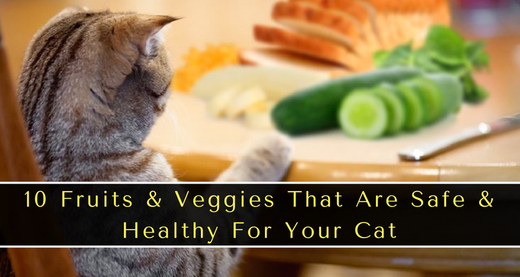It may come as a surprise to many that our carnivores cats don't mind snacking on some natural greens and fresh juicy fruits free of preservatives and additives. Veggies and fruits supplement your feline's main diet of meat & fish with additional nutrients and can be offered from time to time as nutritious snacks.
To end the suspense included in this compilation are safe fruits and vegetables that your kitty will absolutely love to eat while treading on a path of wholesome diet.
1) Carrots- Carrots need to be cooked before serving to a cat sans seasoning. Dice the carrots into small pieces so that they are easy to chew on and don’t turn into a choking hazard. Carrots are a rich source of vitamin A from beta-carotene, vitamin K, biotin, Vitamin B6 and potassium.
2) Broccoli- This food rich in antioxidants is great for your fur-ball when steamed before serving a small portion. Broccoli florets are rich in Vitamin K and C, fiber, potassium and folate.
3) Zucchini- It has potassium, manganese and magnesium in it that will benefit your feline baby. In fact many commercial cat foods are composed of this ingredient.
4) Peas- Peas are another commercial cat food ingredient. There’s no harm in serving this small veggie to your kitty in its natural form. You can steam it before offering to the cat. But do not add any seasoning. Even the frozen variant is fine for your feline friend. Peas contain fiber, protein, vitamin B, vitamin C, carbohydrates and minerals.
5) Green Beans- This vegetable is a great treat for obese cats and a healthy substitute to store bought kitty snacks. Beans contain protein, complex carbs, fiber, antioxidants, vitamins and minerals.
6) Spinach- This super food is a boon to your feline if given in small amounts. Too much consumption must be avoided especially if the kitty is suffering from a kidney disease as it may heighten the issue. Steam the spinach and offer it to the cat sans seasoning. Spinach is an excellent source of vitamins A, C, K, B1, B2, B6, & E, manganese, magnesium, folate, calcium, copper, potassium and iron. It also contains dietary fiber, zinc, protein, phosphorus and choline.
7) Pumpkin/Winter Squash- Plain unseasoned winter squash aids in digestion, mitigates constipation and diarrhea. It is a rich source of fiber and should be given in moderate amounts to the cat.
8) Bananas- Peel the banana and offer a small piece to your kitty. Owing to a high sugar content a sliver or two of the fruit is enough for the pet. Offering too much banana can upset your cat’s stomach. This easy to chew fruit is packed with essential vitamins and minerals.
9) Blueberries- If served in moderation it can act as a great treat for your kitty. This bite-sized snack is packed with antioxidants, vitamin A & C and fiber. Blueberries are also used in commercial foods for cats.
10) Cantaloupe and Watermelon- Your cat will surely love these sweet & nutritive treats. Keep the portion size small and offer these in moderation. Before offering either of the two snacks remove the rind & seeds and cut into small sections so that the cat can easily chew on theses fruits. Always remember to remove watermelon & cantaloupe seeds before serving the fruit as these can be very harmful to your kitty and its digestion process. These fruits are laden with vitamins A, C, potassium and anti-oxidants. Melons have a high-water content and feeding a small amount can tackle signs of dehydration in your pet feline.
You can consult your cat’s veterinarian before adding new foods to its diet. He/she will be able to guide you on portion-size and how often to offer a particular food. However the above list contains fruits and vegetables that are safe for a cat to consume. The first time you offer something new to your furry feline start by serving a very small amount/slice and monitor the cat. If the cat enjoys eating it, watch it for few minutes for any allergy that may surface in it. If the cat appears normal, you can offer some more of the snack/fruit or vegetable.
Apart from snacking your feline with these veggies and fruits, feeding high-quality commercial food with measured nutrition and diet is also equally needed for its growth and health.

